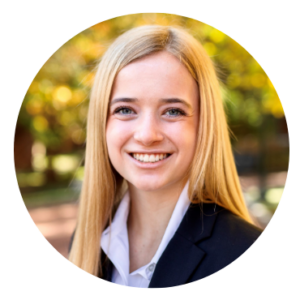Student
Ashley Clarke, W’23

What is your area of study?
Wharton Undergraduate, concentrating in Finance and Business Analytics
What drew you to Penn?
I have always been interested in learning how I can integrate business and data science to solve real-world problems. Wharton’s Business Analytics concentration made Wharton stand out amongst other business schools I was considering. At Wharton, I could learn not only the theories that are crucial to business but also how to apply those theories in real world settings.
How are you engaged with AIAB?
Analytics Accelerator: Senior Analyst (Comcast Project, Fall 2020); Junior Analyst (a Wharton Sports Analytics and Business Initiative project, Summer 2020; Cubic Solutions, Fall 2019)
What were your top takeaways from working on a AIAB project?
This fall, AIAB allowed me to help lead a team of five analysts. Since each member of my team came from a different analytics background, everyone offered a unique perspective on how to approach the problem. Whether my team was brainstorming ideas at meetings or helping each other finish a model, my Analytics Accelerator project showed me how a collaborative team enhances each member’s individual analytical and problem-solving abilities.
Why is working on current datasets and actual business questions important to your educational analytics experience at Penn?
While professors try to provide students with hands-on learning experiences, data sets used in the classroom are often unrepresentative of real-world problems. Having the opportunity to work with real data sets, I was able to gain a deeper understanding of many of the statistical concepts I had learned in my coursework. After working on three Analytic Accelerators challenges, I feel confident in my ability to tackle a real-world, unstructured, data science problem.
How has your experience with AIAB shaped your career goals?
Before working with AIAB, I did not recognize how rewarding it is to learn new information while working on a project. In every AIAB project I worked on, I learned about new statistical methods and was encouraged to think about innovative ways to answer complex questions. After reflecting on my experience with AIAB, I know that I want a career where I am challenged and encouraged to learn new information every day.
What advice would you give students interested in starting a career in data analytics?
Coming into Penn, I had zero data analytics knowledge. At first, I felt like I was behind all my classmates. AIAB and Penn did a great job simplifying and explaining complex data science topics. Now, I know the best way to learn data science is by getting hands-on experience. Therefore, I would recommend to anyone interested in data science, regardless of their current knowledge, to get involved with AIAB programming.
If you could be a statistical model, which one would it be and why?
I would be a LASSO model. Like the Least Absolute Shrinkage and Selection Operator model, I try to maximize the aspects of my life that provide me with the most happiness while eliminating elements that do not add value to my life.
Alumnus
Patrizio Cernetti, WG’16

Current Position: Principal at Legio
What drew you to study at Wharton?
I’m a curious person at the core, so adding a strong business background was a great complement to my knowledge foundation. I particularly liked the environment of the campus and the academic program, so the choice was easy, and I am thankful to have had the opportunity to have this amazing experience.
What inspired you to become a AIAB Senior Fellow?
I love the University settings, where new things and technologies are produced constantly. I’m attracted to this source of innovation and the very talented, like-minded people that generate it as an inspiration for my future ahead.
What were your biggest takeaways from being an Analytics Accelerator mentor?
Quite frankly, how much raw data talent is packed in the teams. With such well-rounded technical power available, the role of the mentor becomes a simple guide to remind that there is a business purpose for the analysis, that our work must align with a problem resolution in the real world. Having a tangible purpose clear in mind is essential to keep a straight line with such accelerated project timelines.
Why is working on current datasets and actual business questions important to a student’s educational analytics experience at Penn?
Academic exercises are tailored to show a few key points in a short amount of time, often with redacted data. Real-life data is full of potholes and surprises, a crossroad of unexpected stories. We should be curious to access any untouched data set, using familiar tools and exploring new ones too, to find the signals that can be used to drive decisions.
What advice would you give someone interested in starting a career in data analytics?
Get exposure to the whole analytics lifecycle, from data exploration/preparation to insight finding and storytelling. In time we can specialize in one or more areas, but a good “data person” needs to know the data journey and have awareness of where their contribution fits into the process and how it can set the stage for maximizing the value in the steps downstream.
If you could be a statistical model, which one would it be and why?
If I have to pick one I would choose Markov Chains: it’s a very versatile model that can describe a very wide range of processes around us and their evolution in time, from the simplest to the most complex, and in a concise and very accessible way. It mostly matches my reasoning: moving from one state to the next weighing the options ahead – adapting to the probabilistic uncertainties of life.


